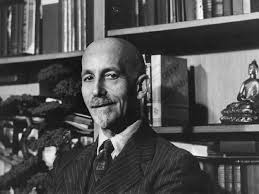Paul Brunton
Neither the body with its senses nor the mind with its thoughts is the ultimate being that I am. The body acts and the mind moves, but behind them is the thought-free Awareness, the Knowing Principle.
The first great error to be thrown away is a common one – acceptance of the physical body as the real self when it is only an expression and channel, instrument and vehicle of the self.
Our every thought and mood suffers from body reference. You have a body but the real you is not physical. You have an intellect but the real you is not intellectual. You have emotions but the real you is not emotional. What then are you? You are the infinite consciousness of the Overself.
The ego expresses desires and preferences, the intellect thinks and remembers, the body’s sense organs experience and perceive the world outside. None of these three is the real “I”-ness of a man.
Too often we say that we are what we are by nature and heredity, but too often we leave out the more important ingredient of selfhood, the one most hidden and most elusive yet the very source of the personal life. That this omission is caused by ignorance, or by lack of any enlightening experience, is true, but does not pardon our inertia and apathy.
For Consciousness gives us the “I,” gives us the world, gives us wakefulness and sleep. It is the stuff of what we really are. Yet all we can say about it is to confuse it with a thing, the fleshly brain, and let it go at that dismissal.
As he understands himself to be, so will he understand the world to be. If he understands that he is only a material body, the world will appear to him likewise. If he finds no spiritual content in himself, he will not find it in the world either.
The body in which he dwells is not himself. The intellect with which he thinks is not himself. The consciousness by which he utters “I” is himself.
This ability to utter the pronoun “I” – to comprehend that he is himself and no one else – vouches for a consciousness which transcends “I” and supports himself.
There is something in each man which says “I.” Is it the body? Usually he thinks so. But if he could set up a deeper analysis, he would find that consciousness would carry him away from the body-thought into itself. There, in its own pure existence, he would find the answer to his question, “Who am I?”
The body is a thought-complex which I have, and as a thought it is certainly part of myself. But that does not make it properly me.
It is a one-sided view which sees man as only a physical being or only a mental being. Nor is it even quite correct to see him as having these two as separate aspects. He is both at once, a psycho-physical being.
This sense, force, or feeling within him, which calls itself I, has its innermost part in that which observes it, the Overself.
Everyone can give his assent to the statement that his physical environment is not himself, but it requires great penetration to give his assent to the equally true statement that his thoughts are not himself.
The “I” is not a thought at all. It is the very principle of Consciousness itself, pure Being.
Excerpted from ‘Notebooks of Paul Brunton’. The 122nd birth anniversary of Paul Brunton is observed on October 21







